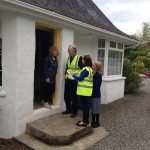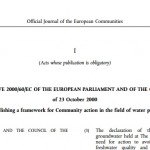]The National Federation of Group Water Scheme who are the…
The WISDOM Project: Learning from Group Water Schemes and connecting water, infrastructure, and people
Group Water Schemes (GWSs) are community managed water suppliers, primarily in rural Ireland. WIDSOM: Learning from Group Water Schemes, an EPA-funded research project, has launched a website www.waterschemes.ie highlighting their research on group water schemes and efforts to protect their sources for drinking water. Patrick Bresnihan tells us about it.
Our research provides analysis of the dynamics that characterise and shape drinking water source protection efforts, be they social, ecological, political, historical, geological, or economic. We are doing our research in Counties Mayo, Monaghan, and Roscommon, and will provide rich, multi-layered accounts that connect water, infrastructure, people, and landscape in ways that are less talked about or understood.
The website uses photographs, interactive timelines and maps together with written analysis and reflection. Images from the field Images from the field offers a lens into the work and contexts of GWS, and includes photographs of water treatment plants, abstraction points, and the surrounding landscape.


Timelines
Timelines present interactive historical accounts of key policy decisions and planning developments that have shaped group water schemes over the last half century. As much as environmental and water quality regulations have impacted water management and the delivery of clean drinking water, so too have policies that have shape land use decisions. Our timelines are grouped thematically, and include the GWS sector’s history, Water Policy and Environmental Policy at the EU and Irish level. We will soon have a timeline on agricultural policy to help trace some of the reasons why rural landscapes, and their water supplies, have changed overtime. Each timeline allows you to advance through different events, providing brief summaries regarding their significance and links to legislation and archival images.

Blog
This page on the website hosts short reflections from fieldwork. These cover a wide range of topics: the importance of karst to water quality in GWSs, the role of technology in shaping GWSs operational activities and agriculture’s historical and present-day role in rural water supplies. We use photographs and graphics to help tell these stories and highlight elements of water quality and provision that may be less well known to many. Examples include the telemetry technology used to detect leaks and monitor and manage water supplies in a GWS.

Maps
The website will also feature maps in the coming months. These will combine existing data sets with our own research to make sense of rural water infrastructure in rural Ireland, and to illustrate the challenges of delivering safe and clean drinking water in visually stimulating and interactive ways.

on www.waterschemes.ie
Patrick Bresnihan, WISDOM Research Project Leader
Learn More:
Twitter: @WSchemes







